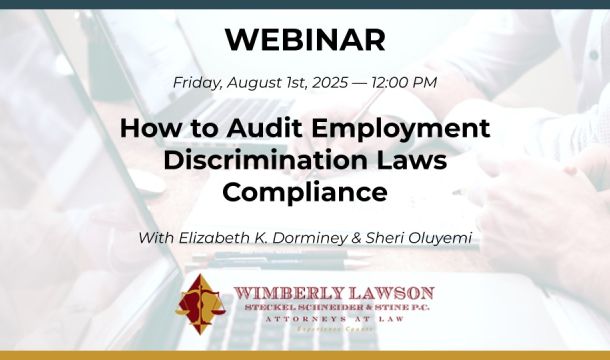Is a parent entitled to use FMLA leave to attend a special education parent-teacher conference? A recent Opinion Letter from the U.S. Department of Labor says "yes."
In a letter published August 8, 2019 (FMLA2019-2-A), Wage and Hour Division Administrator Cheryl M. Stanton responded to a formal request for an opinion on this question. The writer explained that he was the father of two children with FMLA-qualifying serious health conditions. His wife's employer had approved her taking FMLA leave intermittently to take the children to medical appointments but declined her request to take intermittent FMLA leave to attend Committee on Special Education (CSE) meetings to discuss the children's Individualized Education Programs (IEP) at their school. The children receive pediatrician-prescribed occupational, speech, and physical therapy provided by their school district, and meetings are held four times a year to review their educational and medical needs, well-being, and progress. The writer wanted to know if his wife may insist on intermittent FMLA leave to attend these meetings.
Based on the facts provided in the letter, the Administrator concluded that the wife's need to attend CSE/IEP meetings was a qualifying reason for taking intermittent FMLA leave. The Administrator found that the meetings were necessary to "care for a family member … with a serious health condition," as defined in 29 C.F.R. § 825.100(a); and that "to care for" includes "to make arrangements for changes in care." 29 C.F.R. § 825.124(b). That language usually is applied to making medical decisions on behalf of a hospitalized family member or arrangements to find suitable childcare for a child with a disability, even if the decisions do not involve a facility that provides medical treatment. In a previous opinion letter, WHD had found that an employee was entitled to take FMLA leave to attend meetings related to a parent's health condition. WHD Opinion Letter FMLA-94, 1998 WL 1147751, at *1 (Feb. 27, 1998).
Even though the CSE/IEP meetings are focused on education, not health care, the Administrator found that attending the meetings was essential to the wife's ability to provide appropriate physical or psychological care to the children and that her participation would help her make medical decisions concerning the children's care. Bottom line: the wife is entitled to claim intermittent FMLA leave to attend the meetings.
Point/Counterpoint
This is an interesting and controversial letter and provoked considerable debate among the firm's attorneys. Intermittent leave, often taken in small increments, can be an administrative challenge for employers who must track leave use and may need to reschedule other workers to cover for an absent employee. The FMLA's focus has been on dealing with illness and disability, the exception being maternity leave or leave for adoption or foster placement, but this letter suggests that the "medical" aspect needs only to be incidental: the focus of these meetings was on the children's education, not health care. Will this throw wide open the gates for employees to claim leave for a broader scope of activities, on the argument that they are tangentially related to health and well-being? When does an underlying "educational" issue becomes a health issue? Taking a child to the doctor for dyslexia testing or for counseling is covered by the FMLA. Shouldn't meetings with teachers who will be implementing the doctors' orders be covered as well?
Mandatory unpaid leave to attend parent-teacher conferences has been adopted in several States. Nevada requires an employer to grant unpaid leave to a parent, guardian, or custodian of a child who is enrolled in a public school for up to 4 hours each school year to attend parent-teacher conferences, school-related activities during regular school hours, to volunteer at school activities during regular school hours, and to attend school-sponsored events. California allows up to 40 hours of unpaid leave annually; the District of Columbia allows 24 hours each year. Illinois allows up to 8 hours each school year, in 4-hour increments, Massachusetts 12. Minnesota and Louisiana each allow 16; North Carolina matches Nevada at 4. Rhode Island offers 10. Vermont matches D.C. at 24.
CONCLUSION
While this is a somewhat unusual situation, it reminds us that employers need to be proactive in learning the facts surrounding an employee's request for FMLA leave. The notice and certification requirements were meant to foster a dialogue between employer and employee to enable the employer to determine if a leave request meets the requirements under the Act. Employers should use those tools to carefully analyze FMLA-related leave requests. When an employer is in doubt as to whether a request for FMLA leave should be granted, it is best to contact knowledgeable legal counsel for advice.
Related Content
Get Email Updates
Recent Content

TPS Update (as of 2/6/2026)

Job Interviews Can Be a Good Selection Device

Suggestions on How to Diffuse a Tense Situation

Employers Blame Unions for Recent Shutdowns

$27 Million Verdict against Employer on Disability Discrimination over Refusal to Return Employee to Work



